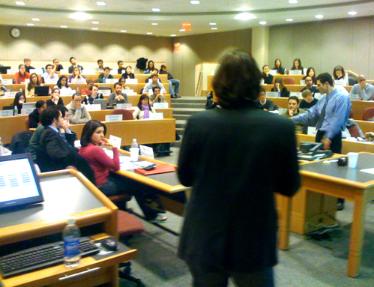Blame the Business Schools - Charlie Warner - MediaBizBlogger

I didn't watch CNN, Fox News, MSNBC, Brian Williams, Charles Gibson, or Katie Couric for the last two weeks during the bailout/rescue/recovery crisis, but I was glued to CNBC and watched Fox Business for a few hours on two days for the purpose of comparing and contrasting its coverage to CNBC's.
There was one issue that I did not see covered, the role that graduate business schools might have played in America's financial and credit markets meltdown. The media missed the story.
Who do you suppose came up with the concept of complex derivatives and credit swaps to manage risk? Who do you think conceived of the complex formulas and algorithms for risk management based on the mathematics of game theory – investment bankers or graduate business school professors?
The answers to these questions can be found in two recently published books: From Higher Aims to Hired Hands: the Social Transformation of American Business Schools and the Unfulfilled Promise of Management as a Profession by Harvard Business School Professor Rakesh Khurana and Managers Not MBAs: A Hard Look a the Soft Practice of Managing and Management Development by Professor of Management Studies at McGill University Henry Mintzberg. Both books are intelligent, scholarly indictments of current educational practices in graduate business schools, especially the top ones such as Harvard, Wharton, Stanford, and Dartmouth.
Khurana traces the history of management education that began in the late 1800s. Business educators' goal was to improve the reputation of management so it would be seen as a profession like law, medicine, and the clergy, with a strong public service commitment. However, after over a century of existence to think that graduates with business degree or and MBA today are committed to public service is a laughable.
Here's a prescient passage from Khurana's From Higher Aims to Hired Hands, written in 2007:
The market logic that has taken over business schools and American business has prevented us from even seeing that there might be an alternative to either markets or regulation as a way of preserving the integrity of our capitalist system.
This self-inflicted blindness is symptomatic of an even deeper malady. Lacking either the religious framework invoked by the founders of the modern university and the university-based business schools, or shared agreement about basic social values, we have no meaningful language for civic discourse about the ultimate purpose of our secular institutions. Thus, we have been left only with empty rhetoric about "excellence" or "leadership" with which to discuss the educational mission of the university. As a result, our universities are now apt to turn out what the late Robert Nisbet calls "loose individuals." The loose individual Nisbet described is someone who does not feel constrained by norms arising from social values such as fairness, or equity, or by allegiance to social institutions such as nations, firms, or even jobs. Such individuals lack any sense of "moral responsibility," often playing "fast and loose with the other individuals in relationships of trust and responsibility." Their relationships with those who are not their intimates are anchored in utilitarian self-interest.
So is it any wonder where the Wall Street greed that was at the core of the current market meltdown was nurtured? Congress has spanked former Chairman of the Federal Reserve Alan Greenspan, and under questioning he admitted his errors in judgment. The Senate and the House Banking Committees should ask the deans of the five top business schools to testify under oath, and ask these academics what they have done to contribute to the crisis and how they might change their ways.
If congress decides to summon a group of graduate business school deans, the deans will certainly be more concerned about whether or not they are asked to appear and are, thus, in the top five than they will be in taking any blame.

